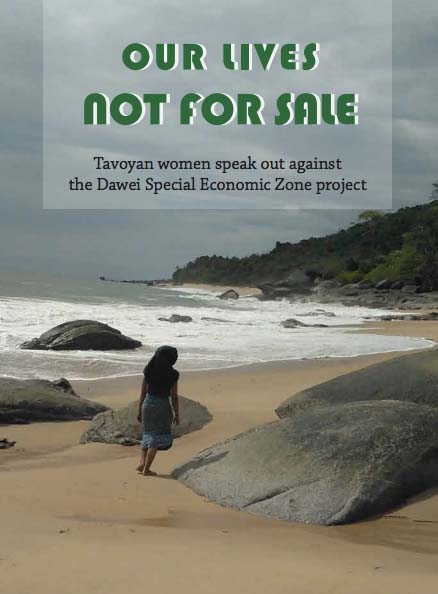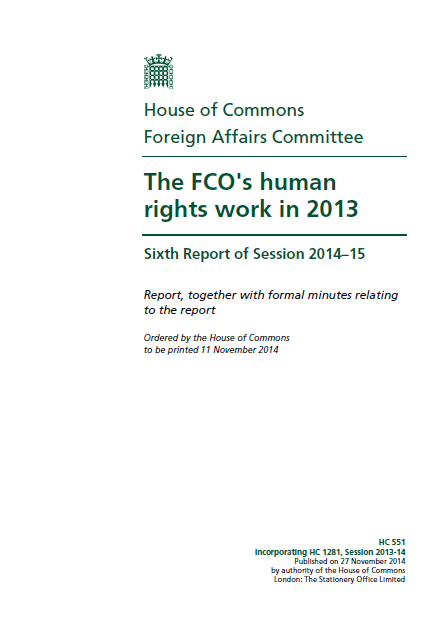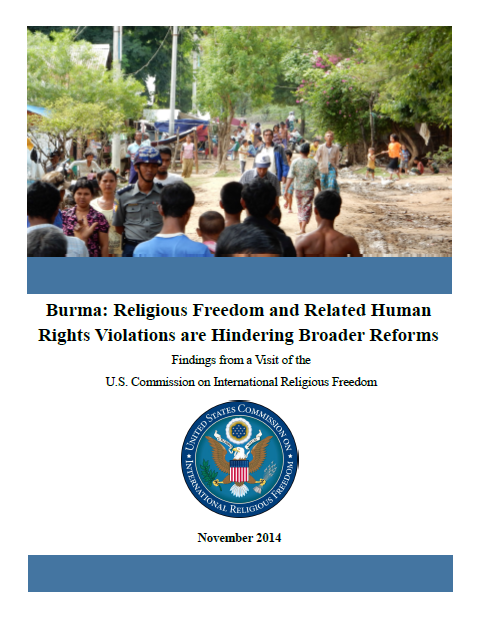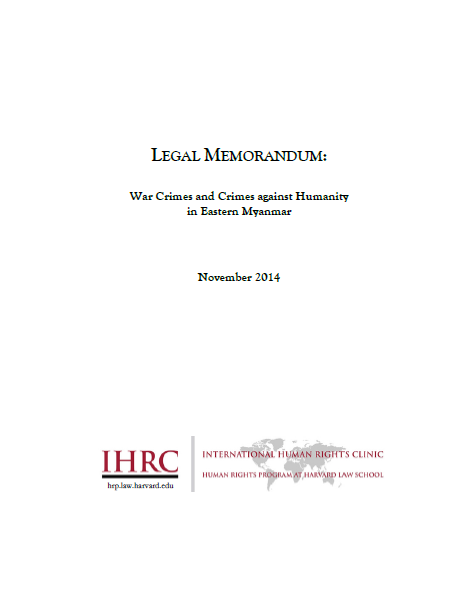Human Rights (383 found)
Our Lives Not For Sale: Tavoyan Women Speak Out Against the Dawei Special Economic Zone Project
 This report exposes the damaging impacts of the Dawei Special Economic Zone (DSEZ) project on rural Tavoyan women living in six affected villages in southern Burma. Most of the local population are fisherfolk and farmers, who have lived sustainably for generations in this isolated coastal area. They have been given no choice about accepting this multi-billion dollor Thailand-Burma joint venture, which will turn their pristine lands into the largest petrochemical estate in Southeast Asia […]
This report exposes the damaging impacts of the Dawei Special Economic Zone (DSEZ) project on rural Tavoyan women living in six affected villages in southern Burma. Most of the local population are fisherfolk and farmers, who have lived sustainably for generations in this isolated coastal area. They have been given no choice about accepting this multi-billion dollor Thailand-Burma joint venture, which will turn their pristine lands into the largest petrochemical estate in Southeast Asia […]
“အစိုးရသစ္ႏွင့္ ျမန္မာႏိုင္ငံ လူ႔အခြင့္အေရး အေျခအေန” အစီရင္ခံစာ
 ၂၀၁၀ ႏို၀င္ဘာလ (၇) ရက္ေန႔ အျငင္းပြားဖြယ္ ေရြးေကာက္ပြဲၾကီး အၿပီး ေပၚထြက္ လာသည့္ ေရြးခ်ယ္ခံ အစိုးရသစ္ လက္ထက္ တြင္ ႏိုင္ငံေရး၊ စီးပြားေရးဆိုင္ရာ အေျပာင္းအလဲ အခ်ိဳ႕ရွိခဲ့ေသာ္လည္း ယခင္ လူ႔အခြင့္ အေရး ခ်ိဳးေဖာက္သူမ်ားအား လံုး၀ကင္းလြတ္ ခြင့္ျပဳထားပါသည္။ ထို႔ျပင္ ယခင္လူ႔အခြင့္အေရး ခ်ိဳးေဖာက္ ခံရသူမ်ားအား ျပန္လည္ ကုစားေပးမႈ လံုး၀မရွိေပ။
၂၀၁၀ ႏို၀င္ဘာလ (၇) ရက္ေန႔ အျငင္းပြားဖြယ္ ေရြးေကာက္ပြဲၾကီး အၿပီး ေပၚထြက္ လာသည့္ ေရြးခ်ယ္ခံ အစိုးရသစ္ လက္ထက္ တြင္ ႏိုင္ငံေရး၊ စီးပြားေရးဆိုင္ရာ အေျပာင္းအလဲ အခ်ိဳ႕ရွိခဲ့ေသာ္လည္း ယခင္ လူ႔အခြင့္ အေရး ခ်ိဳးေဖာက္သူမ်ားအား လံုး၀ကင္းလြတ္ ခြင့္ျပဳထားပါသည္။ ထို႔ျပင္ ယခင္လူ႔အခြင့္အေရး ခ်ိဳးေဖာက္ ခံရသူမ်ားအား ျပန္လည္ ကုစားေပးမႈ လံုး၀မရွိေပ။
အစ္ိုးရသစ္ လက္ထက္တြင္ ႏိုင္ငံအတြင္း လႊတ္ေတာ္မ်ား၊ အုပ္ခ်ဳပ္မႈ ပံုစံမ်ား အသစ္မ်ားႏွင့္ ျမန္မာႏိုင္ငံအမ်ိဳးသား လူ႔အခြင့္ အေရးေကာ္ မရွင္တို႔ ေပၚေပါက္ လာခဲ့ေသာ္လည္း လူထု၏ အေျခခံ အခြင့္အေရးမ်ားကို ထိေရာက္သည့္ ကာကြယ္မႈေပးရန္ ပ်က္ကြက္ဆဲျဖစ္သည္။ လႊတ္ေတာ္ မ်ားမွ ဥပေဒမ်ားေရးဆြဲျပဌာန္း မႈတြင္လည္း လူထု၏ အခြင့္အေရးမ်ားကို အေလးထား ထည့္သြင္းေရးဆြဲျခင္း မျပဳေပ။ ယခင္အစိုးရ အဆက္ဆက္ လူထုအားခ်ဳပ္ကိုင္သည့္ ဥပေဒမ်ားအား ဖ်က္သိမ္းျခင္း၊ ျပင္ဆင္ျခင္း၊ အသစ္ေရးဆြဲျခင္းမ်ား မရွိသေလာက္ နည္းပါးလွ်က္ ရွိပါသည္။ ျမန္မာႏိုင္ငံ အမ်ိဳးသား လူ႔အခြင့္အေရးေကာ္မရွင္ တစ္ရပ္ေပၚေပါက္ လာ ေသာ္လည္း လူ႔အခြင့္အေရး ခ်ိဳးေဖာက္မႈမ်ားအေပၚ ထိေရာက္သည့္ ကာကြယ္မႈမ်ား မေပးႏိုင္ျခင္း၊ ၄င္းေကာ္မရွင္၏ လုပ္ပိုင္ ခြင့္မ်ားအား ထိန္းခ်ဳပ္ ကန္႔သတ္္မႈ မ်ား ခံေနရၿပီး လူ႔အခြင့္ အေရးျမွင့္တင္ရန္ ကိစၥရပ္မ်ားကိုလည္း ေဆာင္ ရြက္ႏိုင္ျခင္း မရွိေပ။ […]
• • •Open Letter: To President Thein Sein
December 08, 2014 President Thein Sein President’s Office Nay Pyi Taw Republic of the Union of Myanmar Re: Prosecution of Shayam Brang Shawng Dear President Thein Sein, We write to you to express our concerns about the criminal prosecution of Shayam Brang Shawng (hereinafter Brang Shawng), an ethnic Kachin resident of Sut Ngai Yang village, […]
• • •The FCO’s Human Rights Work 2013
In this report, we examine the 2013 Foreign and Commonwealth Office (FCO) Report on Human Rights and Democracy (2013 Report), and highlight some areas of particular concern. Promoting human rights should be a foreign policy priority, but for this to be meaningful, we believe that the Department would benefit from the establishment of clearly defined objectives and benchmarks to measure the outcomes of all of its human rights policies, and further prominence being given to these in the Report.
Countries of concern
The FCO designated 28 countries of concern in its 2013 report, where it judged the gravity of the human rights abuses to be so severe that a particular focus should be applied. We have concentrated our attention on three of these countries: Sri Lanka, Burma, and Israel and the Occupied Palestinian Territories. Favourable trade concessions to the EU market should be removed from Sri Lanka if the Government of Sri Lanka continues to deny the OHCHR investigation team access into the country. The Government should advocate re-imposition of sanctions by the EU if there is no improvement in the human rights situation in Burma. The human rights of Israeli, Palestinian and Bedouin citizens living in Israel and the Occupied Palestinian Territories continue to be of serious concern to the UK. […]
• • •‘If they had hope, they would speak’: The Ongoing Use of State-Sponsored Sexual Violence in Burma’s Ethnic Communities
In January 2014, the Women’s League of Burma (WLB) published a report which demonstrated the systematic use of rape by the Burma Army as a strategy to subjugate communities across the country. We documented over a hundred cases of sexual violence in the years since President Thein Sein took office – a number which we believe grossly underestimates the true scale of the problem. Drawing on evidence gathered by our member organisations across Burma, we argued that there are clear links between militarisation, investment and human rights abuses. We also proposed a number of steps to uproot the culture of impunity which surrounds sexual violence, and prevents survivors from obtaining justice. Whilst recent months have seen positive action taken in several areas, the pillars which provide impunity for perpetrators of human rights abuses remain in place. In January, we called for constitutional reform to place the military under civilian control; the establishment of effective judicial and non-judicial mechanisms to investigate human rights abuses, particularly those relating to sexual violence, and; greater participation of women in the peace process dialogue. […]
• • •Myanmar 2014: Civic Knowledge and Values in a Changing Society
 After decades of military rule and isolation, a new Asia Foundation survey shows Myanmar’s citizens are hopeful about the future – on elections, respondents say they believe in exercising their right to vote: 77 percent say that voting can lead to improvements in the future, just 10 percent say things will not change no matter how one votes. But this optimism is tempered by challenges that remain. The findings reveal limited knowledge among the public about government institutions and their functions, low level of social trust, a high degree of political polarization, and deep apprehension about economic opportunities.
After decades of military rule and isolation, a new Asia Foundation survey shows Myanmar’s citizens are hopeful about the future – on elections, respondents say they believe in exercising their right to vote: 77 percent say that voting can lead to improvements in the future, just 10 percent say things will not change no matter how one votes. But this optimism is tempered by challenges that remain. The findings reveal limited knowledge among the public about government institutions and their functions, low level of social trust, a high degree of political polarization, and deep apprehension about economic opportunities.
Myanmar: A Tipping Point for Rohingya Rights?
 Two years after a wave of violence hit the region, Myanmar’s Rakhine State has become a segregated zone. Two million ethnic Rakhine live apart from 1.2 million stateless Rohingya, who are trapped inside displacement camps or barred from leaving their villages. Ending this segregation and protecting the rights of the Rohingya are necessary components of Myanmar’s move toward democracy. However, the Rakhine leadership has rejected – both politically and with force – any reintegration of the two communities, and it is seeking to exclude the Rohingya from any role in the state’s development, distribution of resources, and political representation. […]
Two years after a wave of violence hit the region, Myanmar’s Rakhine State has become a segregated zone. Two million ethnic Rakhine live apart from 1.2 million stateless Rohingya, who are trapped inside displacement camps or barred from leaving their villages. Ending this segregation and protecting the rights of the Rohingya are necessary components of Myanmar’s move toward democracy. However, the Rakhine leadership has rejected – both politically and with force – any reintegration of the two communities, and it is seeking to exclude the Rohingya from any role in the state’s development, distribution of resources, and political representation. […]
Burma: Religious Freedom and Related Human Rights Violations are Hindering Broader Reforms
The dramatic political developments in Burma in recent years are of historical and geopolitical significance. Bur-ma has progressed much further than most might have imagined possible only a few short years ago. Despite these achievements, Burma still has a long journey along the road to democracy and respect for human rights. Serious violations of religious freedom and human rights continue, accompanied by disturbing evidence of prejudice and intolerance, trends that will inevitably and dramatically impact the prospects for a brighter future. In short, the political reform process in Burma is at great risk of deteriorating if religious freedom and the right to equal treatment under the law are not honored and protected. […]
• • •Legal Memorandum: War Crimes and Crimes Against Humanity in Eastern Myanmar
In January 2011, the Harvard Law School International Human Rights Clinic (“the Clinic”) began to investigate the actions of the Myanmar Army during a military offensive in eastern Myanmar (“the Offensive”) that began in late 2005 and lasted approximately three years. The Clinic sought to determine whether violations of international criminal law occurred during the Offensive, and whether there exist reasonable grounds to assert that individual military officers could be held responsible for those crimes. The Clinic’s investigation focused specifically on the conduct of two military units—Southern Regional Military Command (“Southern Command”) and Light Infantry Division 66 (“LID 66”)—in Thandaung Township, Kayin State. […]
• • •Myanmar: Further Information: Activist Organization Targeted again
Two members of the Movement for Democracy Current Force (MDCF) have been given jail terms for peacefully exercising their rights to freedom of expression and peaceful assembly. They must be immediately and unconditionally released. Charges against a third person, who is married to one of the MDCF members and was exercising her right to peaceful protest, should be dropped […]
• • •




 All posts
All posts